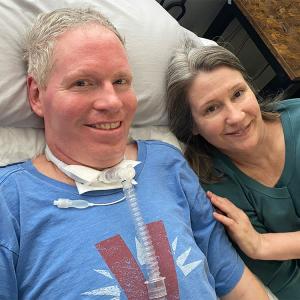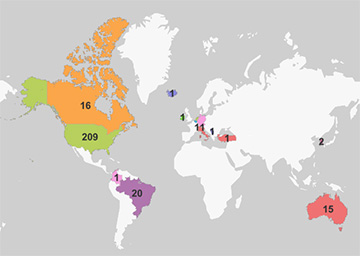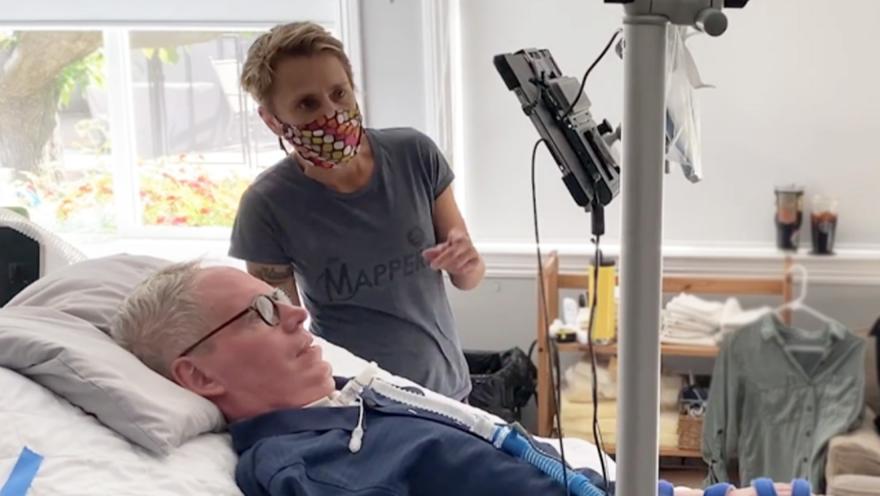Last week in our series “ALS Around the Globe,” we explored how data and the “Science of Where” can help the ALS community access multidisciplinary care. But as we know, ALS does not discriminate, and the world is a big place. For any one person with ALS, accessing the resources they need, or even knowing where those resources are, can be a daunting task.

When Pat Dolan of the geographic information system (GIS) company Esri was diagnosed with ALS in 2016, he knew he wanted to find a way to use his knowledge of data and mapping to benefit others with ALS. Joining forces with friends and former colleagues, Pat set out to develop the ALS Clinic Locator, a resource that would enable the community to easily find ALS multidisciplinary clinics across the United States. The team behind this project dubbed themselves “The Mappers.”
But ALS doesn’t care where a person lives, and a person with ALS in Florence, Italy is as much in need of reliable care and resources as someone in Florence, South Carolina. At the International Alliance of ALS/MND Association meeting in late 2022, proud “Mapper” members Amanda Stanko, senior solution engineer at Esri, and Pat (who joined remotely) shared how they are taking their clinic mapping tool internationally to provide the resource for people with ALS around the world.
“Imagine searching for your location on the map anywhere in the world. And then imagine being able to search for the closest clinic that meets your needs. So if you're looking for support services like genetic counseling and testing or mental health support or technology, but finding that on a map,” Amanda said. “So this is our story. Pat and I, which Pat is the spearhead of what we call ‘The Mappers,’ and our collaboration with the International Alliance of ALS/MND Associations.”
While the idea itself seems cut and dry, there are challenges, starting with the unavoidable fact that the world is a big place. For the global clinic locator to be a valuable tool, the data needs to be reliable. And in plotting where resources are, you also identify additional needs as well. “The information from each country varies. Our hope is that we can provide a standard base of information to help the community find the right clinic in their country,” Pat says. “And identify the gaps in care throughout the world.”

A task as ambitious as a global clinic locator takes even more than a dedicated team like the Mappers, it takes a community, and a global community at that. At the Alliance meeting Amanda and team crowdsourced clinic information from attendees and tasked them with taking the online survey back to their communities. That work continues, and each day more locations are identified and added. “If your clinic is not on the map, then we'd love you to add it to the map,” Amanda said.
And so the map is filled in, bit-by-bit, day-by-day. Completing the task ahead is certainly an immense undertaking, but that isn’t going to scare away a dedicated team like the Mappers. ALS does not stop, and neither does the ALS community.
You can access the Global ALS Clinic Locator HERE. To add an ALS Clinic location, fill out THIS SURVEY. To see more ALS data resources, visit the ALS Geospatial Hub HERE.
Over the next several months, we will be sharing more about the ongoing worldwide progress taking place in ALS research, care and advocacy in our series “ALS Around the Globe.” We hope you will follow along and share with your family and friends.
To continue to follow stories about people living with ALS in the community and learn more about the disease, subscribe to receive our weekly blogs in your inbox HERE or follow us at als.org/blog.


Comments
Hello,
I was diagnosed with limb on-set ALS last fall and am still able to move around and care for myself but am challenged with my breathing. I have family in Italy (Rome & Milan) and would like to spend a month there but am looking for an ALS knowledgeable hospital in case I encounter any problems. There are many listed on the map but can you help me locate a few that could offer care if needed, I am insured so that is not an issue
Thank you
Join the conversation. Please comment below.